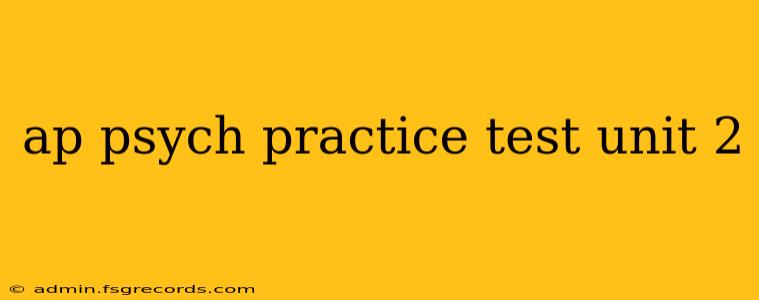This comprehensive practice test covers Unit 2 of the AP Psychology curriculum, focusing on research methods. It's designed to help you solidify your understanding of key concepts and prepare for the AP exam. Remember to time yourself (approximately 60 minutes) for a realistic exam simulation. Good luck!
Part 1: Multiple Choice (1 point each)
-
Which research method is best suited for establishing cause-and-effect relationships? a) Case study b) Naturalistic observation c) Correlation study d) Experiment
-
A researcher wants to study the effects of sleep deprivation on cognitive performance. What is the independent variable? a) Cognitive performance b) Amount of sleep c) Participants' age d) Time of day
-
What is a confounding variable? a) A variable that is measured by the researcher b) A variable that is held constant in an experiment c) A variable that influences both the independent and dependent variables d) A variable that is irrelevant to the research question
-
The ethical principle of informed consent requires researchers to: a) Debrief participants after the study b) Protect participants' anonymity c) Fully inform participants about the nature of the study before they participate d) All of the above
-
A researcher observes children playing in a playground to study their social interactions. This is an example of: a) A survey b) An experiment c) Naturalistic observation d) A case study
-
A correlation coefficient of +0.8 indicates: a) A weak positive correlation b) A strong positive correlation c) A weak negative correlation d) A strong negative correlation
-
Random assignment helps to control for: a) Confounding variables b) Experimenter bias c) Participant bias d) All of the above
-
What is the purpose of a control group in an experiment? a) To manipulate the independent variable b) To measure the dependent variable c) To provide a baseline for comparison d) To introduce confounding variables
-
The placebo effect refers to: a) The improvement of symptoms due to the expectation of treatment b) The harmful effects of a treatment c) The bias of the researcher influencing the results d) The lack of effect of a treatment
-
A researcher uses a double-blind procedure to minimize: a) Confounding variables b) Experimenter bias c) Participant bias d) Both experimenter and participant bias
Part 2: Short Answer (3 points each)
-
Explain the difference between descriptive and inferential statistics. Provide an example of each.
-
Describe the three major types of research designs: experimental, correlational, and descriptive. Briefly explain the strengths and weaknesses of each.
-
What are some ethical considerations that researchers must address when conducting psychological research with human participants?
Part 3: Essay (5 points)
Discuss the importance of operational definitions in psychological research. Explain how poorly defined variables can affect the validity and reliability of research findings. Provide specific examples to illustrate your points.
Answer Key (Multiple Choice):
- d) Experiment
- b) Amount of sleep
- c) A variable that influences both the independent and dependent variables
- d) All of the above
- c) Naturalistic observation
- b) A strong positive correlation
- a) Confounding variables
- c) To provide a baseline for comparison
- a) The improvement of symptoms due to the expectation of treatment
- d) Both experimenter and participant bias
(Note: The short answer and essay questions require detailed responses, demonstrating a thorough understanding of the concepts. This answer key only provides the multiple-choice solutions.)
This practice test provides a solid foundation for reviewing Unit 2. Remember to consult your textbook and class notes for further review and clarification. Good luck with your AP Psychology exam!

